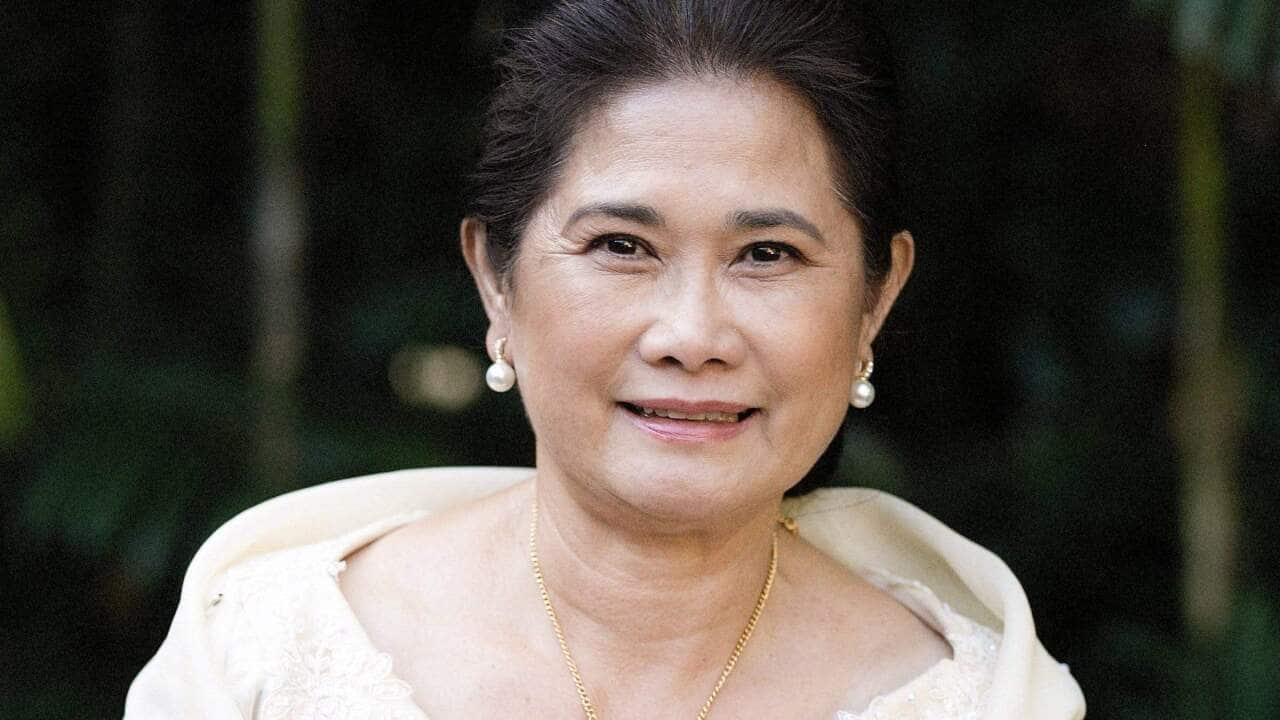This week on Insight, Kumi Taguchi takes a deep dive into relationships of convenience. Can they really work? Watch on .
Our decision to get married was a mutually beneficial one for my husband and I, and with time our love grew.
I came across him by chance one day in 1986, as I was reading an English-language newspaper in my hometown, Manila.
There was an ad that read: ‘An Australian man who wants to meet a Filipina lady for friendship’.
At the time, I had an underlying sense that my life was approaching a major crossroads.
I had completed a journalism degree in Manila and was working as a high school teacher. But the previous few years had been hard.
Lee describes her younger self as “rather conservative” and driven by family values. Source: Supplied
The Philippines was in political turmoil, which spurred the beginning of the massive exodus of Filipinos seeking work opportunities and greater freedoms abroad.
And my family had experienced a tragedy five years earlier, when a house fire caused us to lose my father at the age of 43 and our home. To make things worse, we had no insurance.
I was soul-searching and I was curious. So I decided to respond to the ad.
I had always been rather conservative. In my late 20s, I’d never had a serious boyfriend, choosing to focus instead on my studies and career.
But nearing my 30s and knowing I wanted to be a mother someday, I decided to put myself out there to meet the man I wanted to spend my life with.
A decision to start a new life
The Australian man answered my letter, and in that time before mobile phones and emails, we spent the next two years writing to each other as pen pals.
Lee made the difficult decision to leave her family in the Philippines for the man in Australia she had decided to marry. Source: Supplied
I’d never thought I’d be in a relationship outside of my home culture and was worried about the challenges and judgement that came with it.
During those two years, he flew over from Sydney on three separate occasions to see me and get to know my family.
I fondly remember playing tour guide and showing him around my city of Manila and its nearby provinces.
I was very honest with him. I told him I really wanted to have a family and if I did have children, I wanted them to have better opportunities than I had had.
He was also honest. He was a divorcee and he was happy to provide for me.
As we dated long distance, exchanged letters and he sent me flowers, love grew. And I began to believe he was the man I wanted to start a family with.
Being Christians, I knew it would be a marriage based on traditional family values.
My family were happy for me, because I would be having a better future and starting my family in a much more developed country.
So I made the bittersweet decision to leave my loved ones and my life in the Philippines to be with him.
Facing stigma in Australia
I had arrived in Australia at a time when there was a stigma around bi-racial relationships, especially Filipino women who people believed married older Australian men for their own gain.
The media frenzy around after he died didn’t help. People even asked if I knew her.
I had no idea who or what they were talking about. I’d never considered marrying for my own benefit. I wanted love, loyalty and commitment.
But the stigma crushed my self-esteem.
We married in June 1988 in a very beautiful but simple ceremony at a Catholic church in New South Wales. I was 30 and he was 32.
Months later, we welcomed our first child.
Being a new mother in a new country was tough. I was determined to make it my new home, but I had no support network here, so I had to rely on my husband emotionally and financially.
As I struggled to adjust to my new life as a wife and mother, I reminded myself this was what I had chosen.
Just 18 months later, we welcomed our second child. I loved being a mum and was grateful for the opportunities my children would have in Australia that I could only have dreamed of.
But my ongoing lack of family, friends and support plus the direct and casual racism I suffered all heavily impacted my mental health.
Lee (centre) says she is grateful for the opportunities her children have had in Australia that she “could only have dreamed of” in the Philippines. Source: Supplied
No regrets
A long time later, after 30 years of marriage, my husband and I separated after deciding our relationship had run its course.
I now have two beautiful and successful children as well as grandchildren. And at the age of 65, I have now spent more than half my life in Australia.
I am proud to be a Filipino-Australian, and I am proud my children are Filipino-Australian too.
Looking ahead, I am excited about what the future holds — a future of freedom, opportunity, travel, independence and possibilities.
For all of that, I’m glad I answered that ad for a pen pal.




